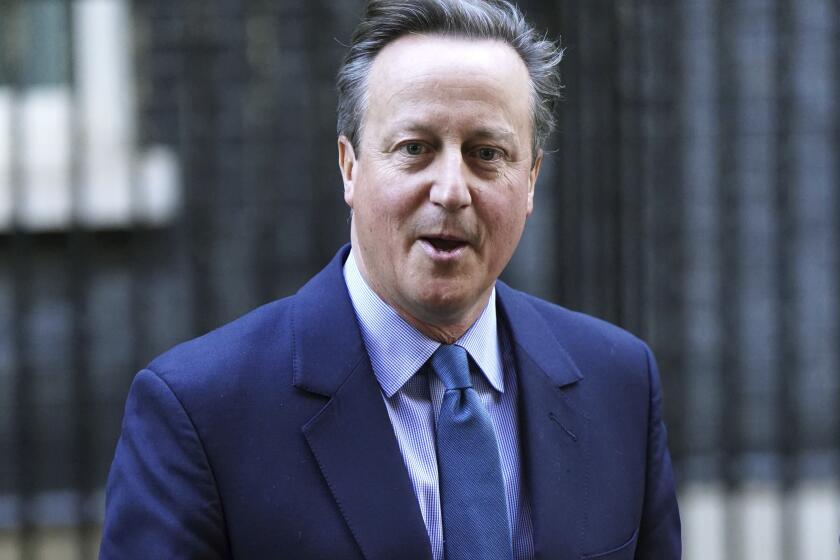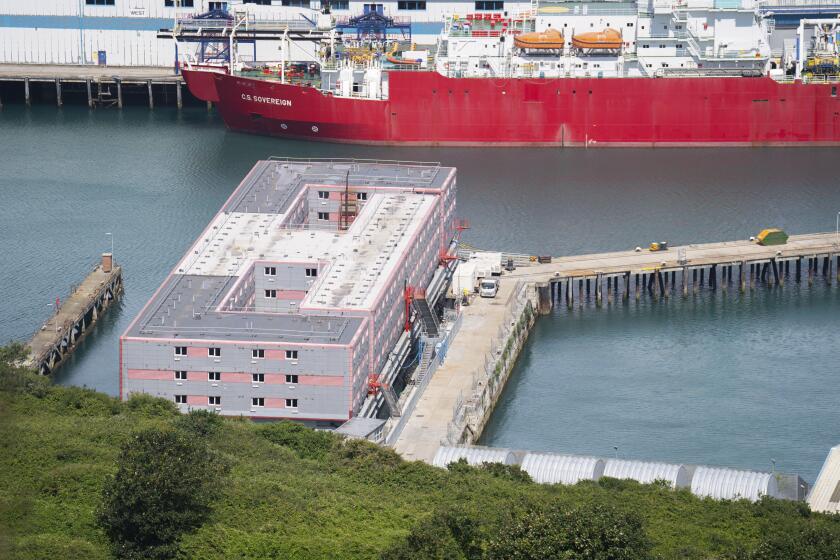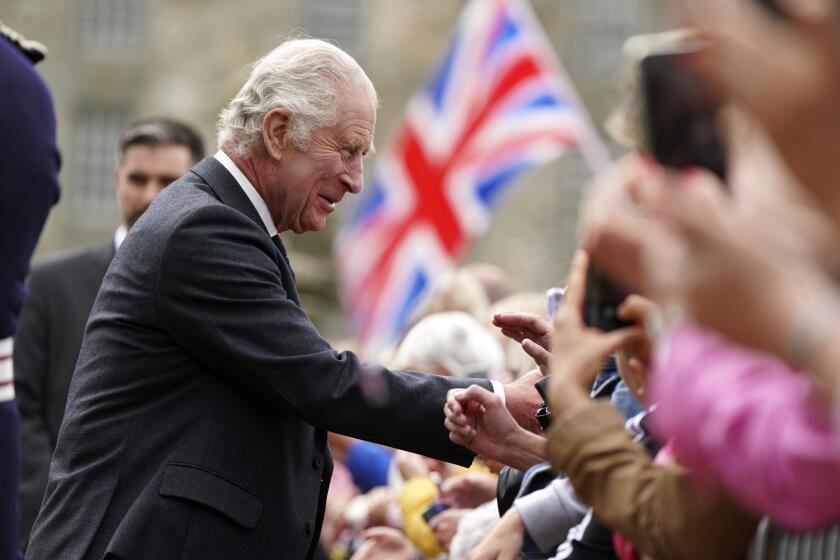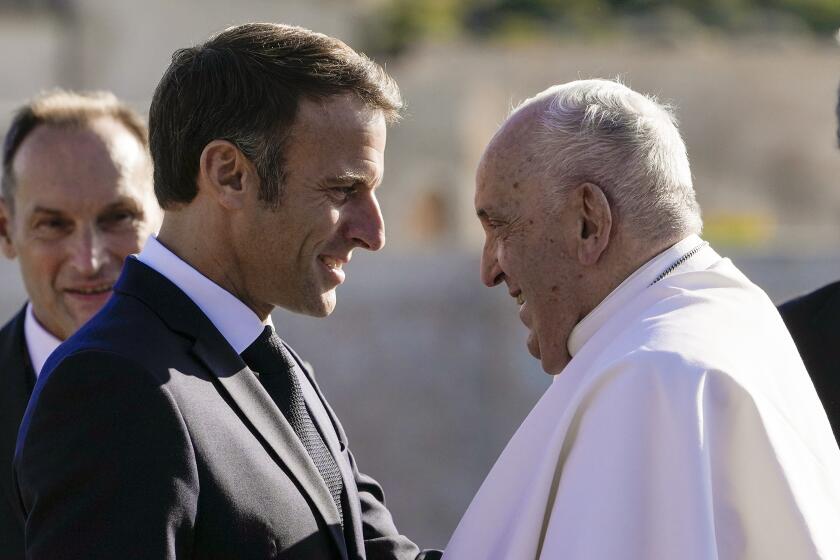Britain’s Supreme Court says government’s plan to ship migrants to Rwanda is unlawful
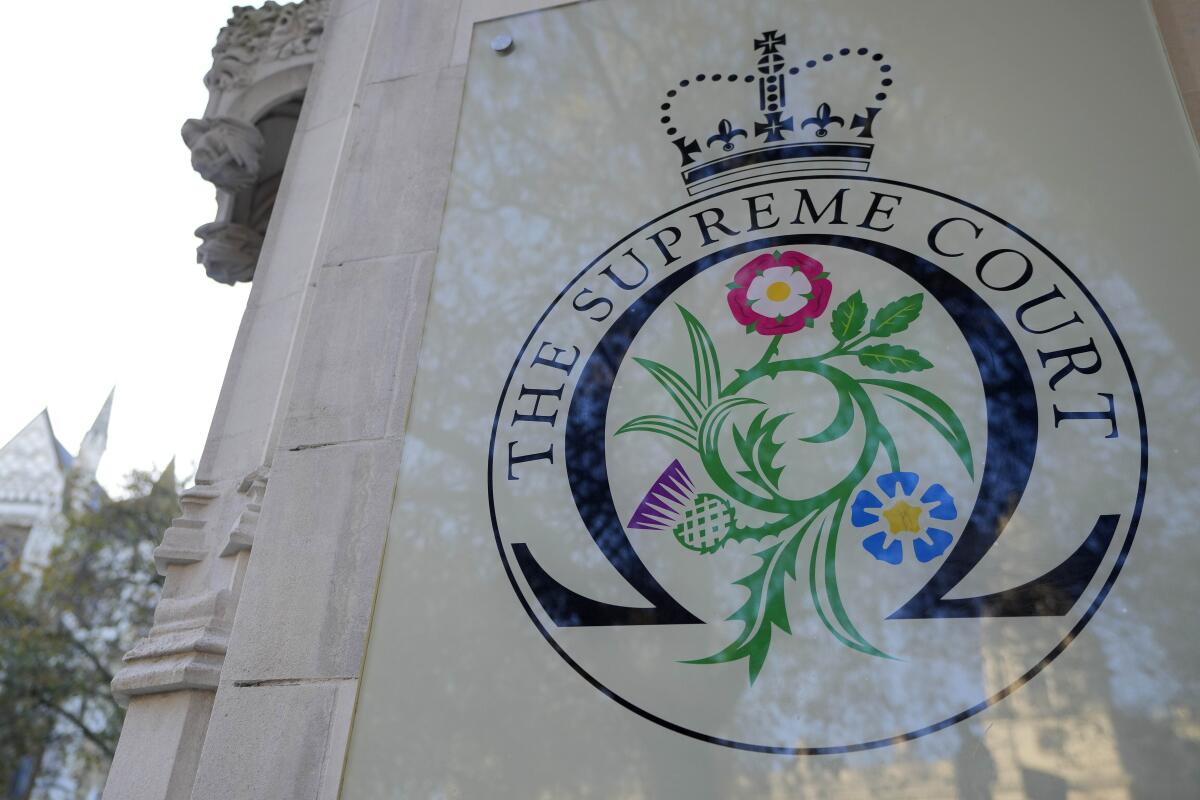
- Share via
LONDON — The British government said Wednesday that it would still try to send some migrants on a one-way trip to Rwanda, despite the Supreme Court ruling that the contentious plan was unlawful.
In a major blow to one of Prime Minister Rishi Sunak’s key policies, five justices on the country’s top court ruled unanimously that asylum-seekers sent to Rwanda would be “at real risk of ill-treatment” because they could be returned to the conflict-racked home countries from which they’d fled.
Sunak, who has pledged to stop migrants reaching Britain in small boats across the English Channel, said the ruling “was not the outcome we wanted,” but vowed to press on with the plan.
He said the court had “confirmed that the principle of removing asylum-seekers to a safe third country is lawful,” even as it ruled Rwanda unsafe.
He said the government was working on a treaty with Rwanda that would address the court’s concerns, “and we will finalize that in light of today’s judgment.” If that fails, he said, he was prepared to consider changing British law and withdrawing from international human rights treaties — a move that would draw strong opposition and international criticism.
Refugee and human rights groups welcomed the court’s decision. Charity ActionAid U.K. called it a vindication of “British values of compassion and dignity.” Amnesty International urged the government to “draw a line under a disgraceful chapter in the U.K.’s political history.”
Former Prime Minister David Cameron has made a shock return to high office, appointed as Britain’s new foreign secretary in a Cabinet shakeup.
Britain and Rwanda signed a deal in April 2022 to send some migrants who arrive in the U.K. as stowaways or in boats to the East African country, where their asylum claims would be processed and, if successful, they would stay.
Britain’s government argued that the Rwanda policy would deter people from risking their lives crossing one of the world’s busiest shipping lanes and would break the business model of people-smuggling gangs. Opposition politicians, refugee groups and human rights organizations said the plan was unethical and unworkable.
No one has yet been sent to the country as the plan was challenged in the courts.
Reading the court’s decision, President of the Supreme Court Robert Reed said Rwanda couldn’t be relied on to keep its promises not to mistreat asylum-seekers sent from Britain.
Britain’s main opposition Labour Party has decisively won two special elections.
He cited the country’s poor human rights record, including forced disappearances and torture, and said Rwanda practiced “refoulement” — sending migrants back to unsafe home countries.
The judges concluded that there were “substantial grounds for believing that there is a real risk that asylum claims will not be determined properly, and that asylum-seekers will in consequence be at risk of being returned directly or indirectly to their country of origin.
“In that event, genuine refugees will face a real risk of ill-treatment in circumstances where they should not have been returned at all,” they said.
The government has argued that while Rwanda was the site of a genocide that killed more than 800,000 people in 1994, the country has since built a reputation for stability and economic progress.
Migrants are evacuated from the barge moored in southern England after environmental samples showed Legionella bacteria in the water system.
Critics say that the stability comes at the cost of political repression. The court’s judgment noted multiple rights breaches, including political killings that had led British police “to warn Rwandan nationals living in Britain of credible plans to kill them on the part of that state.” They said Rwanda had a 100% rejection record for asylum-seekers from war-torn countries such as Syria, Yemen and Afghanistan.
The Rwandan government insisted that the country was a safe place for refugees.
“Rwanda is committed to its international obligations,” government spokesperson Yolande Makolo wrote on X, formerly known as Twitter. “We have been recognized by the [United Nations High Commissioner for Refugees] and other international institutions for our exemplary treatment of refugees.”
Rwandan opposition leader Frank Habineza said Britain shouldn’t try to outsource its migration obligations to his country.
Britain’s King Charles III, on the throne now for 14 months, marked his 75th birthday Tuesday by busily highlighting causes close to his heart.
“The U.K. should keep the migrants or send them to another European country, not to a poor country like Rwanda. I really think it’s not right [for] a country like [the] U.K. to run away from their obligations,” Habineza told the Associated Press in Kigali, the Rwandan capital.
Much of Europe and the U.S. are struggling with how best to cope with migrants seeking refuge from war, violence, oppression and a warming planet that has brought devastating drought and floods.
Though Britain receives fewer asylum applications than other European countries such as Italy, France or Germany, thousands of migrants from around the world travel to northern France each year in hopes of crossing the English Channel.
More than 27,300 migrants have crossed the Channel this year, with the year’s total on track to be fewer than the 46,000 who made the journey in 2022. The government says that shows its tough approach is working, though others cite factors such as the weather.
Start your day right
Sign up for Essential California for the L.A. Times biggest news, features and recommendations in your inbox six days a week.
You may occasionally receive promotional content from the Los Angeles Times.
The Rwanda plan has cost the British government at least $175 million in payments to Rwanda before a single plane has taken off. The first deportation flight was stopped at the last minute in June 2022, when the European Court of Human Rights intervened.
The case has gone to the High Court and the Court of Appeal, which ruled that the plan was unlawful because Rwanda is not a “safe third country.” That was challenged at the Supreme Court by the government, which held hearings on the case last month.
Sunak took comfort from the court’s ruling that “the structural changes and capacity-building needed” to make Rwanda a safe country “may be delivered in the future.” The British government says its legally binding treaty will compel Rwanda not to send any migrants deported from the U.K. back to their home countries.
The prime minister is under pressure from the right wing of the governing Conservative Party to take dramatic action to “stop the boats.” Former Home Secretary Suella Braverman, a hard-liner who was fired by Sunak on Monday, has said that Britain should withdraw from the European Convention on Human Rights and its court if the Rwanda plan were blocked.
Pope Francis is challenging French President Emmanuel Macron and other European leaders to open their ports to people fleeing hardship and poverty.
Sunak told lawmakers in the House of Commons that he was “prepared to change our laws and revisit those international relationships” if other routes failed.
Legal experts said that would be an extreme move. Joelle Grogan, a senior researcher at U.K. in a Changing Europe, a think tank, said leaving the European Convention would make Britain “an outlier in terms of its standards and its reputation for human rights protection.”
“The only reason in which you would leave the ECHR is if you wanted to start sending asylum-seekers to unsafe countries where they face threats to their life,” she said.
More to Read
Sign up for Essential California
The most important California stories and recommendations in your inbox every morning.
You may occasionally receive promotional content from the Los Angeles Times.
